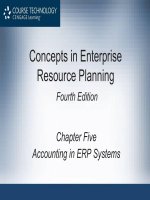Enterprise resource planning 1st by mary summer chapter 07
Bạn đang xem bản rút gọn của tài liệu. Xem và tải ngay bản đầy đủ của tài liệu tại đây (206.91 KB, 13 trang )
Enterprise Resource Planning, 1st
Edition by Mary Sumner
Chapter 7:
ERP Systems: Human Resources
© Prentice Hall, 2005: Enterprise Resource Planning, 1st Edition
7-1
Objectives
•
Examine the HR processes supported by ERP
•
Understand the interrelationships among business
processes supporting human resource management
© Prentice Hall, 2005: Enterprise Resource Planning, 1st Edition
7-2
Case: Atlantic Manufacturing
•
•
•
•
•
Recruitment, training, and retention of sales
force is difficult
HR records inadequate
HR paperwork and compliance requirements
increase steadily
Management of compensation packages
difficult
Needs to create a strategy for controlling the
cost of various employee benefits
© Prentice Hall, 2005: Enterprise Resource Planning, 1st Edition
7-3
Human Resources Problems
•
Maintaining accurate employee information
•
Job analysis and design
•
Applicant selection
•
Compensation
•
Benefit administration
•
Training
•
Governmental reporting
© Prentice Hall, 2005: Enterprise Resource Planning, 1st Edition
7-4
Evolution of HR Systems
•
Traditionally relied upon stand-alone systems
– Specialized applications for applicant
tracking, compensation, benefits,
attendance
•
Redundant data
– No link to financial systems
•
ERP
– Linked to financial systems
– “Best practices”
© Prentice Hall, 2005: Enterprise Resource Planning, 1st Edition
7-5
ERP HR Modules
•
Components
–
HR Management
•
•
–
Benefits administration
•
•
–
Links employee data to actual benefits
Allows selection from group of benefits
Payroll
•
–
–
Personnel records
Resumes
Paychecks, tax reports, accounting data
Time and labor management
Employee/Manager self service
•
•
•
Travel reimbursement
Personnel data and benefits changes
Training class
© Prentice Hall, 2005: Enterprise Resource Planning, 1st Edition
7-6
HR Modules
•
Attributes
–
–
Integration
Common database
•
–
–
–
–
–
–
Provide audit trails
Scalable and flexible
Drill-down capability
Workflow management for electronic routing of
documents and other document management
Process standardization
Security
User friendly and web-accessible
© Prentice Hall, 2005: Enterprise Resource Planning, 1st Edition
7-7
© Prentice Hall, 2005: Enterprise Resource Planning, 1st Edition
7-8
Management Control Modules
•
•
HR information enables management of diverse workforce
Supports managerial decision making through query and
reporting tools
Operational level controls
•
–
–
–
–
–
•
Strategic level controls
–
–
–
–
•
Maintain and update employee files
Job analysis files
Design files
Regulatory files
Skills inventory files
Human capital inventory for tracking employees
Position control linked to budgeting
Labor/management relationships
Business intelligence tools for predicting trends
Module integration is significant benefit
© Prentice Hall, 2005: Enterprise Resource Planning, 1st Edition
7-9
Featured Article: Keep Track of
Your Employees
•
What are the benefits of automated time and
attendance records?
•
What advantages might accrue to employees using
these systems?
© Prentice Hall, 2005: Enterprise Resource Planning, 1st Edition
7-10
Featured Article: Keep Track of
Your Employees, continued
•
Employees’ attendance, time at work, and
skill levels
–
–
–
–
•
Most companies uncertain
If tracked, usually manual
Records usually neglected
Often piece-meal, no end-to-end solution
Benefits of automating
–
Eliminates manual process
•
•
•
•
Time-consuming
Error-prone
Better analysis
More control
© Prentice Hall, 2005: Enterprise Resource Planning, 1st Edition
7-11
Featured Article: Keep Track of
Your Employees, continued
•
Banner Health
–
Selected Kronos Inc. software
•
•
•
Time- and labor-management
Accessible from web, phone, badge terminals
Information available in real-time
–
•
•
Allows for quick staffing adjustments
Financial benefits to employees, company
Smurfit-Stone Container Corp
–
Uses Workbrain Inc.’s ERM3, SAP financial
applications, and PeopleSoft payroll processing
•
Web-based employee-relationship management
software
–
–
Optimized scheduling and tracking of employees
Interfaces with PeopleSoft applications
© Prentice Hall, 2005: Enterprise Resource Planning, 1st Edition
7-12
Summary
•
ERP systems include HR modules that offer records
management, benefits administration, and payroll
– Offer integrated operational and strategic
level controls
– Scalable and very flexible
© Prentice Hall, 2005: Enterprise Resource Planning, 1st Edition
7-13









